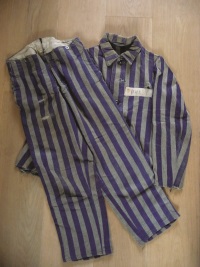It was on the night of my mother’s 16th birthday, May 10, 1940, that the small kingdom of the Netherlands was invaded by neighbouring German troops. So instead of happy birthday greetings by family members, my mother was glumly told that morning: “It’s war.” It would take almost five years to the day before the Germans capitulated on May 5, 1945.
Three days after the German invasion, the Dutch army surrendered after the city of Rotterdam was bombed to rubble and Nazi rule began. At first, life seemed to go on as usual. But gradually, the German occupation began to be felt by the population as a whole and certainly by the large Jewish population of the city of Amsterdam, my mother’s hometown. For centuries, many Jews had settled in the Dutch capital to find shelter from the pogroms and persecution experienced in various places. For that reason, the city was, and still is, called Mokum by its residents. The name comes from the Hebrew mokom, meaning “safe haven.”
But a few years into the occupation, Mokum was no longer a safe place. By 1943, the year my parents became engaged, the Nazi killing machine was in full swing. In great numbers, the Jewish population was rounded up and put on transport to various death camps.
As the harshness of German rule increased, so did opposition to the regime. My father became involved in finding hiding places for Jewish refugees (children in particular) and my mother became a courier for the Dutch Resistance, which meant biking all over the country, sometimes with weapons in her saddlebags, often with memorized codes and messages that needed to be relayed from one group to another. On and off, both sets of grandparents sheltered Jewish people in their homes. Everyone involved in these clandestine activities knew they could easily lose their lives because of their actions.
In June of 1944, my father thought he was going to a meeting of his underground group but, as soon as he stepped into the room, a hand was placed over his mouth. He and 22 other young men were taken first to a concentration camp in the Dutch town of Vught and several months later to the concentration camp Sachsenhausen near Berlin, where he became prisoner #100535.

In the year that followed, during which he and other inmates were subjected to unspeakable brutality and witnessed inhumane acts, the Russians liberated the camp on April 21, 1945. As the whole continent of Europe was in chaos, it would take my father a good six weeks to find his way back to his homeland.
In the meantime, during that last winter, things were getting more desperate by the week in the Netherlands, especially in the cities. There was no transportation, no electricity and, in particular, no food. By early 1945, people started to die of starvation. To this day people speak with great gratitude of the food dropped by the Allied forces (called Operation Manna) that took place in late April 1945. And there is even more gratitude and emotion when people talk about the Canadian troops who risked their lives, and in many cases paid the ultimate price, to liberate the Netherlands. My mother was one of the young women who rode the Canadian tanks into Amsterdam on that jubilant day, May 5, 1945.
Still, for my mother, Liberation Day was tinged with sadness, as she had no inkling of her fiancé’s whereabouts, let alone knowledge of whether he was even still alive. When May turned into June, it was assumed my father was not coming back.
One morning, June 6, 1945, my maternal grandfather, a man of few words but with strong Christian convictions (he was a high school principal who served as church organist on Sundays) was splitting bits of scrounged wood as fuel. The doorbell rang and my grandfather pulled the rope that opened the door a few stories below. To his amazement, it was my father who came shuffling up the steep staircase, still in his striped concentration camp suit, weighing about 100 pounds on his six-foot-three frame. I remember my chatty grandmother telling the story of my father’s return on many occasions. Apparently, when my Opa saw my father, he started banging his axe against the staircase railing and he shouted to his wife: “Vrouw, vrouw, Johan is terug.” Whenever my grandmother told this story, my Opa would nod.

As a child I realized that this story of my father’s return was not just remembering a special occasion. For my grandparents, it was a profound statement of faith. One who was presumed dead was alive and although they never said this in so many words, I know that they clearly saw God’s hand in this unexpected return.
It took some time for it to sink in that the suffering that had taken place in the German camps was off the scale of human imagination. Of the 23 young men in my father’s illegal group, he was the only one to survive. In the early ‘90s, my father was added to the list of the “Righteous among the Nations,” a distinction awarded by Yad Vashem in Israel to gentiles who risked their lives to save Jews during the Holocaust. The cost of discipleship on the part of my parents was high but my siblings and I give thanks to God for knowing that in the time of testing, our parents did the right thing.
So, as we remember the innocent victims of the Holocaust, let it be our hope and prayer that the world will never again witness such horror.

